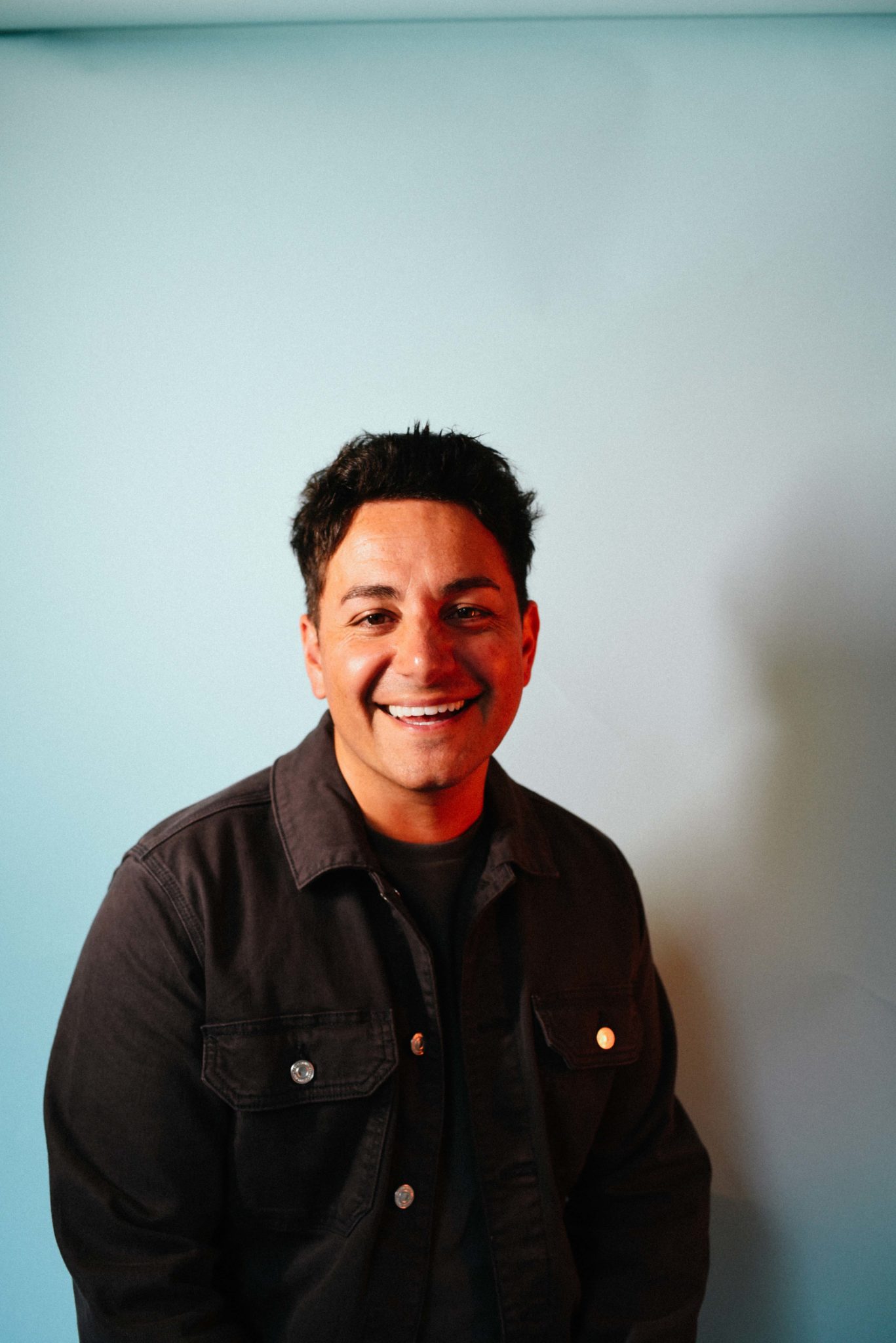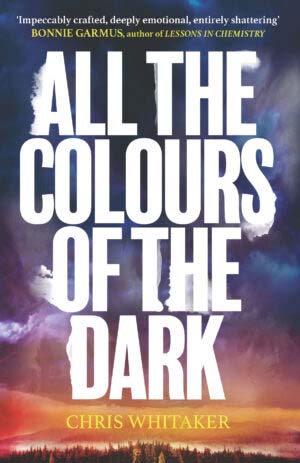- Culture
- 27 Aug 24

Chris Whitaker discusses his gripping new novel All The Colours Of The Dark, wild experiences in the London financial sector, and having his work adapted for television.
Chris Whitaker is relaxed now that he’s back on this side of the Atlantic. Popping into Hot Press HQ on a pleasant Friday afternoon, the Londoner is just about recovered from his jetlag after a flurry of promo across the US in support of his new novel, All The Colours Of The Dark. Everyone – including Oprah – is reading it. He got the call that it was No.2 on the New York Times bestseller list while having dinner the night before we meet. It’s all, in his words, “slightly surreal.”
“I’ve been nervous about this book because it feels like it’s the best I can do,” he says. “I couldn’t change a single word, and I’ve never had that before. I thought if people don’t like this one, I’ve got nothing else to give them, so I’m relieved more than anything.”
The work in question – it’s his third novel – is an intricate story of friendship, obsession and self-discovery. Cast your mind’s eye to ‘70s Missouri, where the fictional town of Monta Clare is sent into shock when teen Joseph ‘Patch’ Macauley is abducted. Meanwhile, he lies alone in a lightless room, before feeling a literal touch of Grace – another girl trapped in there with him.
In the midst of darkness they fall in love, but upon Patch’s escape, there isn’t a shred of evidence to suggest that Grace ever existed, sending him on an epic journey across the US in a desperate effort to find her. A harrowing atmosphere of neglect, violence and isolation permeates throughout. It’s intense, so much so you suspect that it could only be created by someone who experienced these emotions first-hand.
“I don’t think I could have tapped into what it feels like without guessing, and that wouldn’t feel quite right to me,” Chris admits.
Advertisement
Having suffered domestic abuse as a child, the author was also the victim of a stabbing when he was 19. One thing, he says with candour, may have contributed to the other.
“When I was 10 my mum’s boyfriend broke my arm,” he reflects. “It was ingrained in me that you can’t always ask for help, and if you do, no one will come. I think if I was mugged and I hadn’t been attacked when I was younger, I probably would have given the mugger my phone without fighting. I never wanted to feel like a victim when I was a kid, so when someone tried to take something from me, I would rather get stabbed than give it to them.”
 Chris Whitaker. Copyright Miguel Ruiz.
Chris Whitaker. Copyright Miguel Ruiz.RELIGIOUS VIEWS
In All The Colours Of The Dark , Patch turns to painting in an effort to conjure up an image of his ephemeral friend. Using art as a means of managing trauma is one of many parallels between the protagonist and his creator.
“It was PTSD that led me to writing,” Chris explains. “Whenever I was stressed, or having a difficult time, I would return to writing. The library was a big part of my life. My mum worked two jobs and wasn’t there when I got home from school. I would hang out in the library because I didn’t like going back to an empty house. After I was stabbed, it became a safe place. I borrowed a book on PTSD which talked about therapeutic exercises.
Advertisement
“Writing things down, and keeping it insular and not having to talk outwardly to anyone – that really appealed to me. It fit my personality and I’m still about it now. If something’s going wrong I’m the last person to tell anyone, often to my detriment. I certainly teach my kids that it’s okay to ask for help. They’re very different from how I was.”
As well as reflecting Chris’ childhood trauma, socio-political matters seep into All The Colours Of The Dark. Religion and more particularly (without spoiling too much) abortion, in the shadow of the landmark Roe vs Wade ruling, play a prominent role.
”The stars of the show are thirteen when the book begins, so they don’t really care about anything beyond their immediate problems, school and getting a date for prom and things like that. But then these outside forces begin to creep in as they get older. My mum was Catholic, my dad is an atheist and they divorced when I was quite young.
“She wanted me and my brother to be christened, and he wanted us to make up our own minds. It was a battle that raged – there were these opposing views that I found quite interesting. One Instagram review said, ‘I had to stop reading because your religious views clearly don’t gel with mine’, but it’s dialogue. I’m not giving it a slant. In the narrative, each character has their own view, even if it’s something I have strong views about personally.
“It’s a hot topic in America. These poor women that have to drive across seven states to get an abortion, it’s such a mess.”

TV ADAPTATION
Advertisement
Upon arriving at the world-famous Hot Press office, Chris, like many a wide-eyed visitor, was admiring the gallery of signed covers along the wall. A guitar-slinging Pete Doherty circa 2005 catches his eye, with the writer noting that he’s a big fan.
He’s no stranger to the Libertine lifestyle either. In the aftermath of being stabbed, Chris became a day trader in the financial bastion of Moorgate in London, working his way up the ladder. Then he breached trading rules, and ended up owing half a million pounds to his bosses. Still in his early 20s, it was an extraordinarily time, in a hitherto eventful young life.
“I was there for the last days of the wild drug-taking and client entertaining, before the crash,” says Chris. “There was a strip club called Stringfellows. I was in there so much that the dancers came to my wedding. The back row of the church was just strippers. They really were my friends – they’re lovely, interesting people. Some of them had economics degrees but kept stripping because it paid so well.”
Unlikely friendships aside, life in the pit of London’s fiscal belly grew tiresome – leading Chris to deal with the stress and demons the only way he knew how.
“We’d have clients come over and they’d want to go to brothels and all that,” he says. “I’d be sitting at a bar in Mayfair and they’d be off with sex workers. I felt as if I was a pimp or something. Then you’ve got to be back at your desk at five or six, so I slept in the office. I just got sick of it. I still trade with my own money because it gives structure to my day.
“I like sitting at a desk at a certain time, so I spend an hour a day doing it. But by the time I turned 30, I was at a crossroads. I paid back all the money I owed and had to decide what I wanted to do with the rest of my life. I was really miserable, really deeply unhappy. I looked back over my life and thought, ‘What’s the constant? What’s the thing that I always turn to?’ And it was writing.”
Nowadays, there’s plenty for the author to look forward to, with All The Colours Of The Dark snapped up by Universal for a TV adaptation.
Advertisement
“I’m exec producer, which means I get some involvement, but I’m not precious about it at all,” says the author. “I know it needs to exist in a different format. There’s a writer called Sarah Gubbins who wrote Pam And Tommy – she’s great and really gets it. They’re talking about turning the book into three seasons and a pilot’s been written already, so I’m looking forward to reading that.”
• All The Colours Of The Dark is out now.










